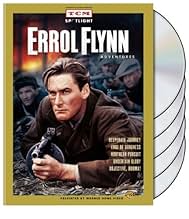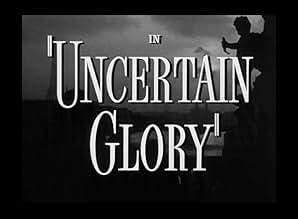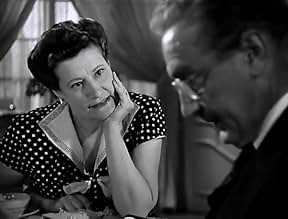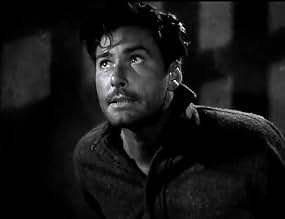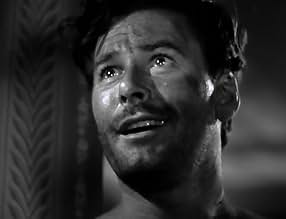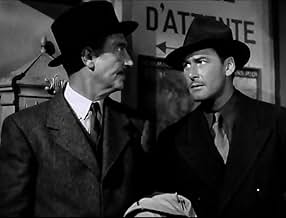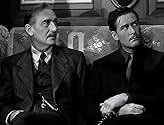AVALIAÇÃO DA IMDb
7,1/10
1,5 mil
SUA AVALIAÇÃO
Adicionar um enredo no seu idiomaAfter a career criminal is recaptured and knows he faces the guillotine, he offers to exchange his life for 100 hostages slated for execution by the Germans.After a career criminal is recaptured and knows he faces the guillotine, he offers to exchange his life for 100 hostages slated for execution by the Germans.After a career criminal is recaptured and knows he faces the guillotine, he offers to exchange his life for 100 hostages slated for execution by the Germans.
Douglass Dumbrille
- Police Commissioner LaFarge
- (as Douglas Dumbrille)
Felix Basch
- Gestapo Major
- (não creditado)
Frederic Brunn
- German Soldier Reporting to Major
- (não creditado)
Nora Bush
- Townswoman
- (não creditado)
James Carlisle
- Townsman
- (não creditado)
Wallis Clark
- Razeau
- (não creditado)
Pedro de Cordoba
- Executioner
- (não creditado)
Fred Cordova
- Execution Guard
- (não creditado)
Enredo
Você sabia?
- CuriosidadesErrol Flynn was criticized for playing heroes in World War II movies. Tony Thomas in his book 'Errol Flynn: The Spy Who Never Was' states that Flynn had tried to enlist in every branch of any armed services he could but was rejected as unfit for service on the grounds of his health. He had a heart condition, tuberculosis, malaria and a back problem. Flynn felt he could contribute to America's war effort by appearing in such films as Revolta! (1943); Perseguidos (1943); Demônios do Céu (1941), Um Punhado de Bravos (1945) and Três Dias de Vida (1944). Reportedly, Flynn was at his most professional and co-operative he ever was whilst working on Second World War movies. The studios apparently did not diffuse the criticism of Flynn's state-of-health as they wished to keep it quiet for fear of his box-office draw waning.
- Erros de gravaçãoAbout 1:20 into the film, there is a scene where the French police are coming into the town at night. One, on a motorcycle, rounding a corner, seemingly slips on the wet cobblestones and crashes in front of the camera - the shadow of his head flashes across the bottom of the screen and the sound of his presumed crash can be heard.
- Citações
Jean Picard: [indignantly to the barber just before he is to be sent to face the guillotine] My head comes off as it is!
- ConexõesFeatured in The Adventures of Errol Flynn (2005)
- Trilhas sonorasLa Marseillaise
(1792) (uncredited)
Music by Claude Joseph Rouget de Lisle
Variations in the score often
Avaliação em destaque
Uncertain Glory (1944)
A rather good war drama, a bit pre-packaged but very well done, as pretty much all Warner Bros films were from this era. Errol Flynn was at a point in his career when he wanted to become a "leading man" in the broader sense, not just a sword-fighting (and handsome) daredevil.
Key to the movie is the quasi-propaganda quality of the movie, set and made during World War II. That's not a bad thing—it's not government propaganda at all, but simply rooting for the good guys, and putting the French (our allies) in a good light (which they deserve).
The plot twist is simple and comes out early, so this gives nothing away—Flynn is a petty criminal who killed someone in a moment of panic, almost by accident, and he's about to have his head chopped off. But then an opportunity (dramatically and beautifully done) suggests a different way to die: for the Cause. The question is whether he can follow through, or whether he'll follow his new romantic (and idealized) love interest to a free new life.
It's all rather good even if contained in movie expectations. The police detective who is guarding and helping Flynn's character is a stalwart of the period, Paul Lukas, and he adds a needed level of gravity and even complexity to the interactions. Flynn is a cheerful presence—very American (even though he's from Tasmania!)—but he often responds rather than leads his scenes. The third lead is the woman, played with wonderful honesty by Faye Emerson.
Part of enjoying these WWII movies is knowing their context, and getting how the audience was wild for a sense of the war, of knowing who was winning, and of sensing how the scene worked, what the French were really like, what the chances were for a soldier caught up in it all. Their brother, their son. And that's kind of what this movie is about, showing heroism, and goodness, and how the war is a just cause and the Nazis are truly horrible (they were). Flynn does what he needs to do here, and if there is artifice and some lack of total believability, that's almost necessary so that a safe distance and cushion is in place.
Not an essential movie, but a really good one, especially if you already like this kind of film and this era.
A rather good war drama, a bit pre-packaged but very well done, as pretty much all Warner Bros films were from this era. Errol Flynn was at a point in his career when he wanted to become a "leading man" in the broader sense, not just a sword-fighting (and handsome) daredevil.
Key to the movie is the quasi-propaganda quality of the movie, set and made during World War II. That's not a bad thing—it's not government propaganda at all, but simply rooting for the good guys, and putting the French (our allies) in a good light (which they deserve).
The plot twist is simple and comes out early, so this gives nothing away—Flynn is a petty criminal who killed someone in a moment of panic, almost by accident, and he's about to have his head chopped off. But then an opportunity (dramatically and beautifully done) suggests a different way to die: for the Cause. The question is whether he can follow through, or whether he'll follow his new romantic (and idealized) love interest to a free new life.
It's all rather good even if contained in movie expectations. The police detective who is guarding and helping Flynn's character is a stalwart of the period, Paul Lukas, and he adds a needed level of gravity and even complexity to the interactions. Flynn is a cheerful presence—very American (even though he's from Tasmania!)—but he often responds rather than leads his scenes. The third lead is the woman, played with wonderful honesty by Faye Emerson.
Part of enjoying these WWII movies is knowing their context, and getting how the audience was wild for a sense of the war, of knowing who was winning, and of sensing how the scene worked, what the French were really like, what the chances were for a soldier caught up in it all. Their brother, their son. And that's kind of what this movie is about, showing heroism, and goodness, and how the war is a just cause and the Nazis are truly horrible (they were). Flynn does what he needs to do here, and if there is artifice and some lack of total believability, that's almost necessary so that a safe distance and cushion is in place.
Not an essential movie, but a really good one, especially if you already like this kind of film and this era.
- secondtake
- 2 de jun. de 2014
- Link permanente
Principais escolhas
Faça login para avaliar e ver a lista de recomendações personalizadas
- How long is Uncertain Glory?Fornecido pela Alexa
Detalhes
- Data de lançamento
- País de origem
- Idiomas
- Também conhecido como
- Três Dias de Glória
- Locações de filme
- Escondido, Califórnia, EUA(vineyard scenes)
- Empresa de produção
- Consulte mais créditos da empresa na IMDbPro
- Tempo de duração1 hora 42 minutos
- Cor
- Proporção
- 1.37 : 1
Contribua para esta página
Sugerir uma alteração ou adicionar conteúdo ausente



